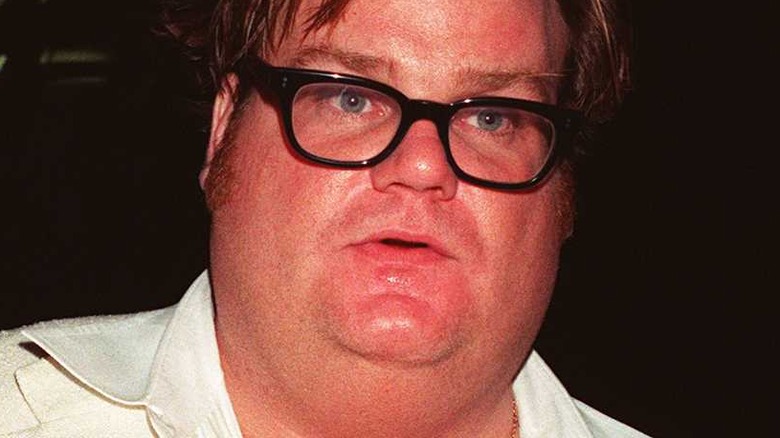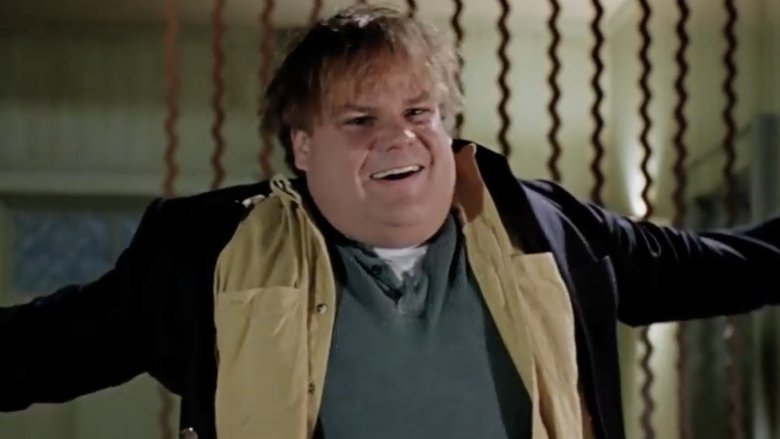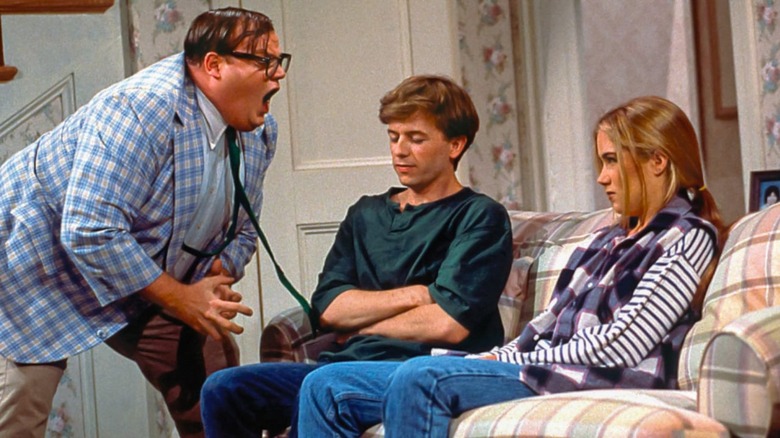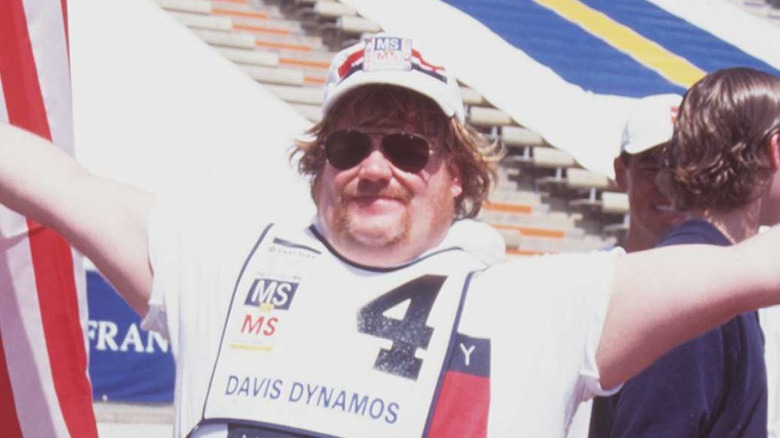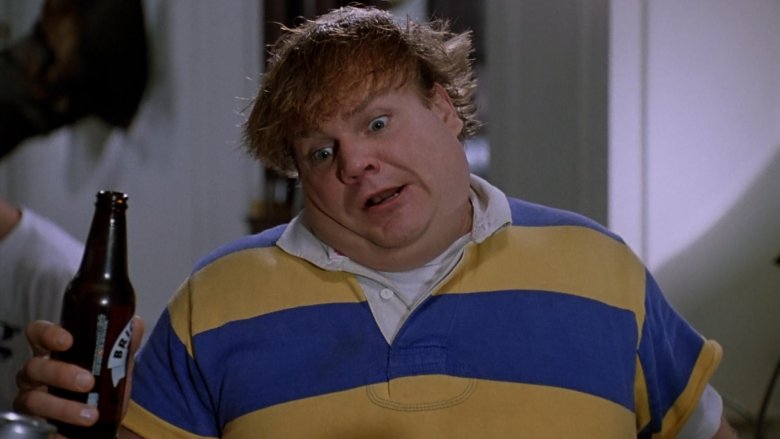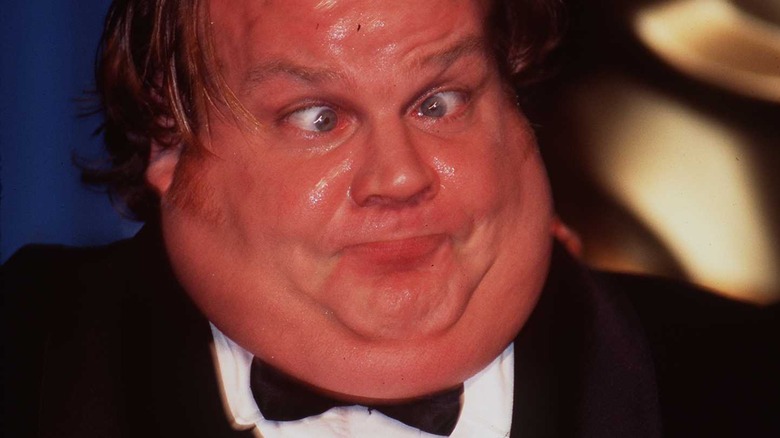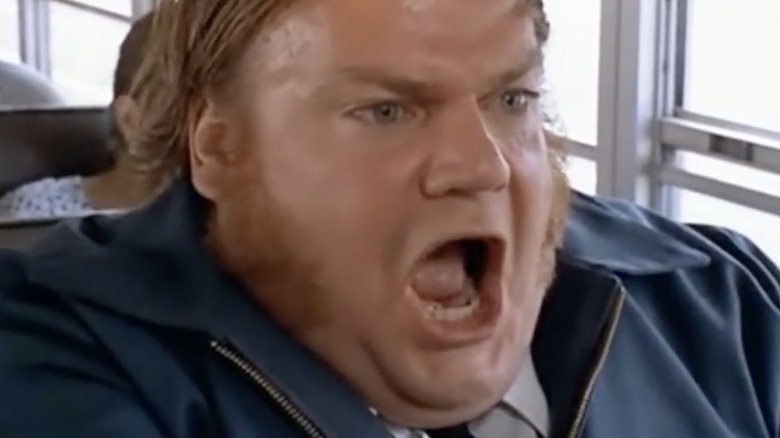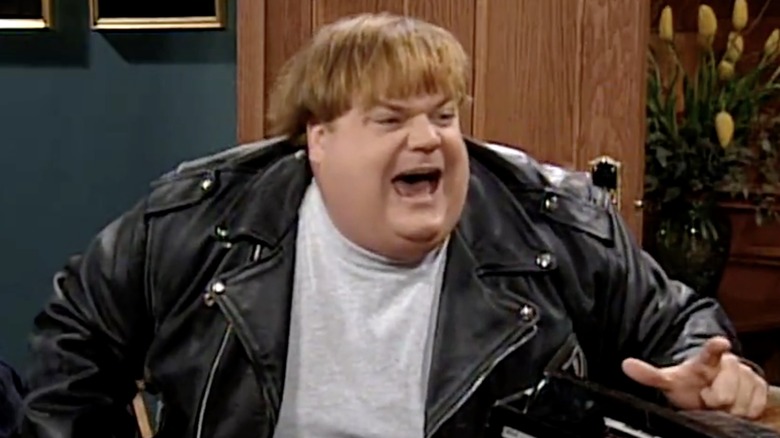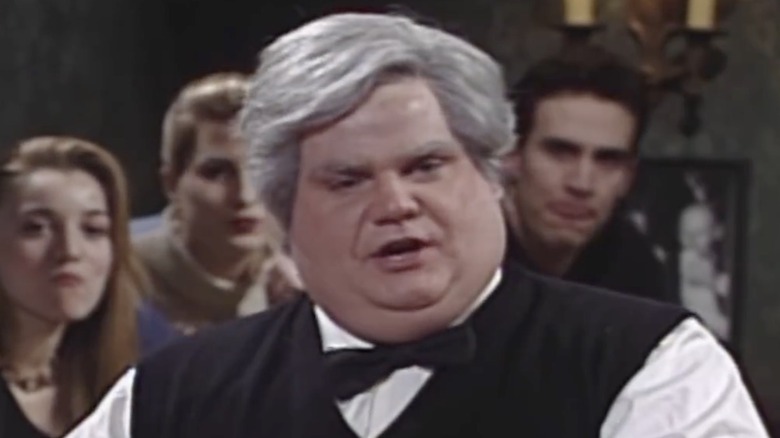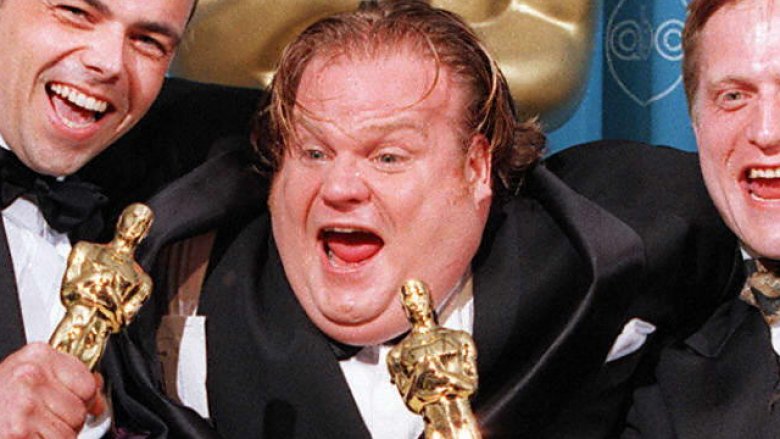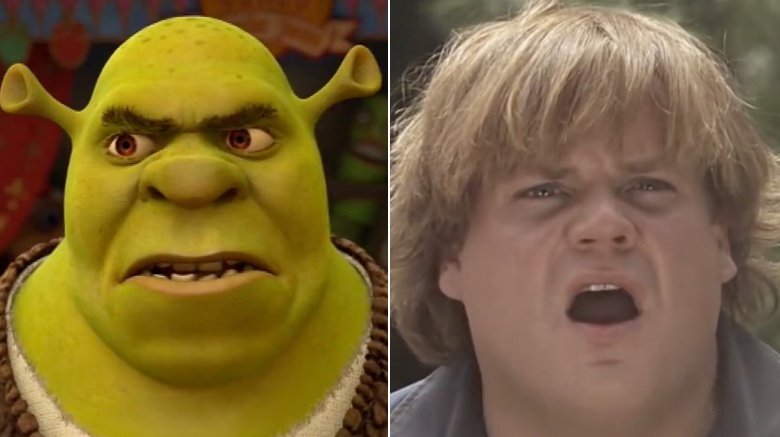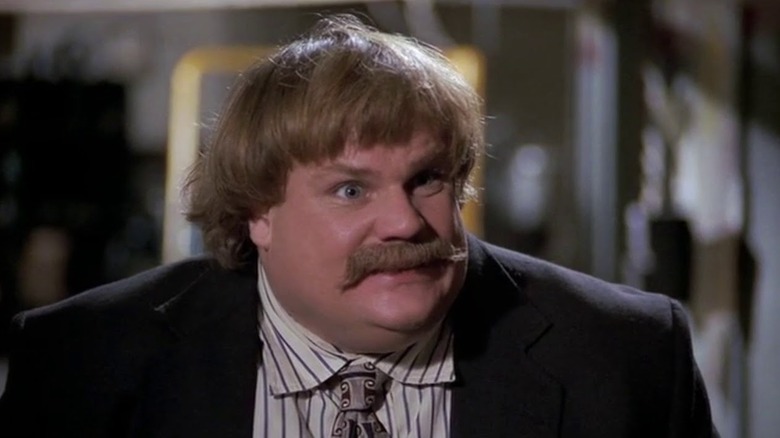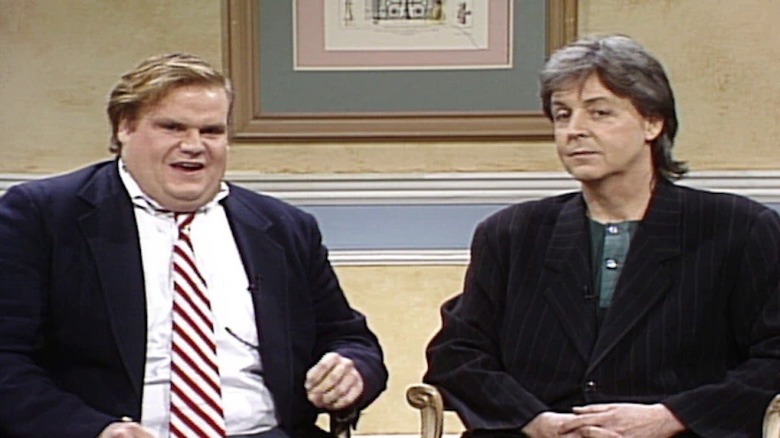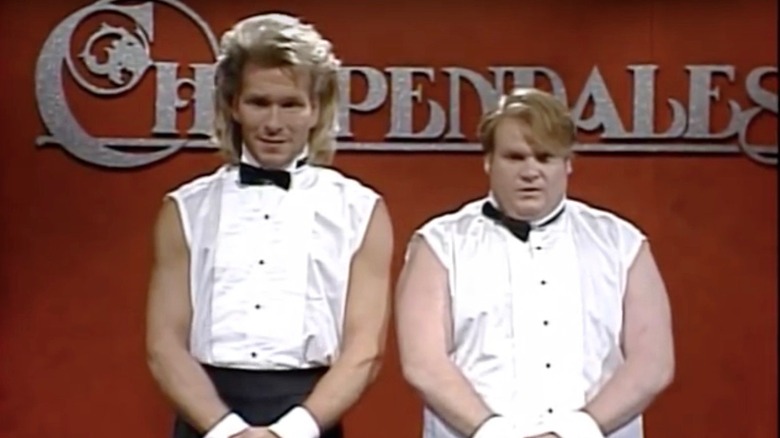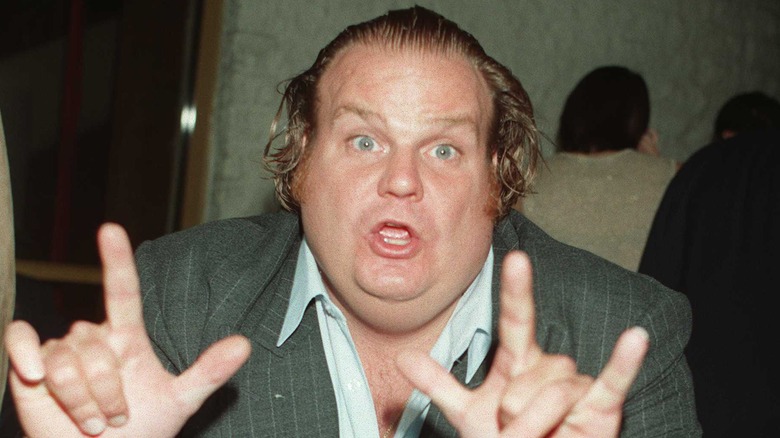Chris Farley: The Story Behind The SNL Star Gone Too Soon
Holy schnikes, was there a funnier actor — or a comedian as universally beloved — as Chris Farley in the '90s? At the dawn of the decade, Farley joined the cast of "Saturday Night Live" and almost immediately made himself one of the show's biggest stars thanks to wild characters like Todd O'Connor, the Chicago Bears super-fan; a young woman who worked at the Gap (alongside friends and frequent collaborators Adam Sandler and David Spade); and, of course, Matt Foley, the motivational speaker who lived "in a van down by the river." His film career quickly blossomed, too, from memorable bit parts (like a kid-hating bus driver in "Billy Madison" and an unhinged stagehand in "Wayne's World 2") to starring roles in the buddy comedies "Tommy Boy" and "Black Sheep." (And don't forget about the ridiculously fun "Beverly Hills Ninja").
His film career was far shorter than it should have been — he died in 1997 at age 33. And there was a lot more to Chris Farley than just yelling and falling down. Here's a look into the life and mind of a star who left us far too soon.
The sacred origins of Fat Guy in a Little Coat
Undoubtedly, one of Farley's most hilarious bits is "Fat Guy in a Little Coat." Even in "Tommy Boy," a movie that's 90 percent Farley schtick, it's a standout. In a moment when Richard (David Spade) grows exasperated with the buffoonish antics of Tommy (Farley), Tommy grabs Richard's tiny blazer, puts in on, and chants "fat guy in a little coat." Then he sings those words while swinging his arms and dancing around, ultimately ripping the jacket right down the back.
It feels like an organic moment, even improvised, and that's probably because it came from Farley and Spade messing around in real life. "Chris was always doing that bit to me at work," Spade said during a Reddit "Ask Me Anything" session. "He would say, 'Davey... turn around,' and I said, 'If this is Fat Guy in a Little Coat I'm not turning around, it's not funny anymore.' And he would say 'No, I've got a whole new thing I'm doing.' And then I'd turn around, and it would be him in my Levi jacket, and he would say 'Fat guy in little coat! Don't you give up on it!'"
The story of a man... and his van down by the river
Bob Odenkirk isn't just the guy behind Saul Goodman on "Breaking Bad" and "Better Call Saul" — he's also a phenomenal sketch comedian. He gave the world "Mr. Show with Bob and David," and he also wrote for "Saturday Night Live." When the show was on its summer hiatus in 1990, Odenkirk went back to his hometown of Chicago to work with the famed Second City comedy theater. Also making a name for himself at Second City that summer: Chris Farley, polishing up his skills during the few months he had before he was set to join the cast of "SNL." Getting a jump on any NBC-funded collaboration, Odenkirk and Farley created for the Chicago stage the character of Matt Foley, the woefully ineffective, perpetually-screaming motivational speaker who tries to scare kids straight by warning them they could wind up like him, living in "a van down by the river." (And then he'd fall into something and break it — in other words, comedy gold.)
The name of the character comes from a close friend of Farley's. The real Matt Foley did much better for himself than the fictional one. He and Farley played rugby at Marquette University together. He went on to become a priest in suburban Chicago, and he led Farley's funeral service in 1997.
He was a star athlete
Farley was a big guy, but he carried himself on screen and on the "SNL" stage with the grace of an athlete, or even a dancer. That made his physical comedy and stunt work — falling through a table as an overexcited Matt Foley, or flying on wires as Weekend Update correspondent Bennett Brauer, to name two examples — all the more impressive. It's probably not too much of a surprise, then, to learn that young Chris Farley was an extremely talented and accomplished athlete. He was on the heavier side as a child and, despite not having the body one would usually associate with a swimmer, he was positively dolphinesque. "Chris would get up on the blocks as a 10-year-old and kids would start snickering at him," his brother Tom Farley said in Rolling Stone. "Then he'd hit the water with those big, broad shoulders of his, go into the butterfly stroke, kicking up this rooster tail, and leave those kids in the dust."
Chris Farley did have the traditional build of a football player, and as a high schooler in Madison, Wisconsin, he made the all-city team as a defensive lineman. He had a dream of going pro after school, but when he graduated he realized that at 5'9" and 230 pounds, he probably wouldn't be big enough to be an effective NFL player.
Saturday Night Live actually fired Chris Farley
Chris Farley was a standout not just during his era of "SNL" (the early 1990s), but of the entire 40-plus year run of the late-night comedy institution. He certainly ranks with the show's greats, like John Belushi, Dana Carvey, Eddie Murphy, and Kristen Wiig. (Rolling Stone placed him 15th on its rank of every cast member ever.) He gave the world so many memorable moments, including sad-sack motivational speaker Matt Foley, his Chippendale's audition opposite Patrick Swayze, and "The Chris Farley Show," to name a few.
However, for the impression that he made, Farley's tenure on "SNL" was relatively brief — just five years, from 1990 to 1995. It ended right around the time his first big movie, "Tommy Boy," hit theaters, so it may look like Farley did what so many other "SNL" superstars had done, which was jump ship for a movie career. That's not what happened at all: Farley was fired. Show mastermind Lorne Michaels and other producers, looking for a fresh start, fired most of the 1994-95 cast, including notable names such as Adam Sandler and Farley.
His prank game was legendary
Chris Farley was a consummate comedian, meaning he was pretty much always after a laugh. Always. Forever creating found comedy, Farley had an appetite for disgusting stunts. He was especially fond of nudity-based pranks, which frankly border on assault. According to interviews in the documentary "I Am Chris Farley," he once removed his organ from his pants during a high school typing class and tried to type with it; that got him suspended until the end of the semester. When he got to "Saturday Night Live," he'd keep an eye on Mike Myers when he'd head into the shower and join him in the same stall, in the buff, which unnerved Myers.
According to "SNL" writer and featured player Fred Wolf, Farley once stuck his bottom half outside of a seventieth-floor window at NBC's facility at Rockefeller Center and, well, moved his bowels. Wolf also recalls a time when the actor reported naked to a meeting in "a very crowded writers' room — mixed company, women, men." He had, however, concealed his genitals, which were "tucked between his legs... he was doing Jame Gumb 'Silence of the Lambs.'" At that point, Wolf asserted, Farley did unprintable things to himself with a golf club.
He apparently had quite the temper
Chris Farley often played sensitive, hurt, and even broken characters — his shy "Chris Farley Show" version of himself, Tommy Callahan in "Tommy Boy," and Matt Foley, to name one example for each. Farley also lent a boisterous energy to almost every role he played, and when the cameras weren't rolling, he could apparently be just as wound up as the characters. On an episode of "The Late Late Show with James Corden," David Spade recalled that when the cast of "Tommy Boy" arrived for filming in Toronto, Farley felt under the weather and went to bed early, so Spade went out to grab a drink with co-star Rob Lowe.
Farley heard about that innocent friend date, and apparently he was the extremely jealous type. "Next day he's in make-up staring at me in the mirror," Spade told Corden. "I know this look and it makes me nervous. He goes, 'How's Rob Lowe?'" Farley then greatly escalated things. Later that day, Spade said he was eating a sandwich when Farley "comes over and he crunches my hand... with his boot. And then I got up and I threw my Diet Coke on him. It was straight out of 'Atlanta Housewives.' Then he threw me down the stairs and then they said 'Action.'"
His ill-fated final appearance on SNL
In October 1997, Chris Farley returned to "Saturday Night Live" as a guest host, and it was not an easy week for anyone. Farley was supposed to bring along a sobriety coach; instead, he showed up ready to drink. "The second I saw him at the first meeting, I knew he was looped," an "SNL" crew member told Rolling Stone. "He was not in shape the way he had been five years earlier," "SNL" boss Lorne Michaels said, adding, "And while I felt good about the show, I think he was spent" by the time the episode took place on Saturday night.
That episode opened with a twisted, but apparently honest, sketch in which Michaels is concerned that Farley is too unstable to host the show. Cast member Tim Meadows reassures him, claiming that Farley's "last trip to the spa did the trick." Farley then shows up, and to prove his mettle, introduces his sobriety sponsor: Chevy Chase, another former "SNL" cast member who also struggled mightily with substance abuse. Later in the show, after Farley grew visibly winded during a sketch, Norm Macdonald struck out with a "Weekend Update" joke, and asked the audience to laugh for a while because the extra time "helps Farley have a little rest." That "SNL" episode turned out to be the last time Farley would ever perform for an audience.
Sobriety struggles
Farley struggled with addictions to drugs and alcohol, and he sadly lost that war on December 18, 1997. The comedian and actor was discovered in his Chicago apartment after reportedly going on a four-day bender. But Farley wasn't exactly a reckless junkie, or a live fast/die young kind of guy — he desperately tried to get clean. In just the last two years of his short life, Farley entered rehabilitation facilities 17 times, which is to say nothing of other attempts at a healthier life, such as quitting substances cold turkey, weight-loss programs, joining Alcoholics Anonymous and Overeaters Anonymous, and interventions from friends and coworkers. Farley even checked himself into the famous Hazelden drug rehab center in Minneapolis just before his death, but he always struggled to fully quit for long.
That commitment extended to movie sets. The last film Farley worked on was the adventure comedy "Almost Heroes." During the first week of shooting in 1997, Farley was drinking so much that when producers found out, they threatened to shut the movie down. That led Farley to hire a sobriety guard, who hung out with him for the duration of the shoot, making sure he didn't ingest any illicit substances, while producer Denise Di Novi found Alcoholics Anonymous meetings for the actor to attend.
What could have been
Chris Farley was among the biggest comedy stars in the world when he died in 1997, and he was young — just 33 years old. He likely had a long career in front of him, and his death brought an end to a number of intriguing projects that could have shown Farley was capable of a lot more than just broad, physical comedy. He had interest in starring in a film based on Mordecai Richler's cult-favorite humor novel "The Incomparable Atuk," a satire about an Inuit who leaves Alaska for the first time and experiences culture shock in New York City. (Horribly, similar heavyset, died-too-young stars like Sam Kinison and John Candy had earlier tried to star in the movie).
Farley also nearly starred in a movie version of "A Confederacy of Dunces," the Pulitzer Prize-winning classic novel about an arrogant, overeducated loser living amongst colorful characters in 1960s New Orleans. It's safe to say Farley could have even scored himself some Oscar buzz for another project he had in the works; the starring role in a movie about old-time Hollywood star and scandal magnet Fatty Arbuckle, with a script written by David Mamet.
The one true Shrek
Prior to his death, Chris Farley completed his work on "Almost Heroes" and had several potential movies waiting for him, but there was one other one for which he'd almost finished his work — and it could've combined his fantastic gifts for comic yelling and playing sensitive, misunderstood characters. Farley had been cast in the title role in "Shrek," and he'd recorded about 85 percent of his lines. Production held up for a year while the filmmakers decided what to do, even considering employing a Farley sound-alike to record the final 15 percent of dialogue.
Finally, producers decided to recast and start over with a brand-new actor: Mike Myers, Farley's old "Saturday Night Live" castmate. Myers' interpretation of the character, which became the foundation of a blockbuster "Shrek" franchise, was very different from Farley's, as leaked rough footage later showed. Farley's take was much more understated and even dramatic than Myers' broadly comic, Scottish-accented version.
Chris Farley was secretly charitable
Chris Farley was a religious guy throughout his lifetime, raised in the Roman Catholic faith. He was educated in parochial schools according to The Bozho, attending the Catholic-affiliated Marquette University. In his adult life, that spirituality manifested as a commitment to community service. Farley did a lot of hands-on charity work, even after he ascended to stardom as one of the most famous and recognizable comedians on the planet.
According to the documentary "I Am Chris Farley" (via The Washington Post), in his days as a performer with the Second City improv troupe, he'd never accept payment for charity shows, stipulating that his salary should go to whatever charity the performance benefitted. After he moved to New York for "SNL," Farley frequently volunteered at shelters and unhoused meal centers, and he also made visits to pediatric wards at local hospitals. Most of his closest friends didn't even know that Farley did all that stuff until long after he died.
The Chris Farley Show sketch was an inside joke
Across his half decade on "Saturday Night Live," Chris Farley established a few recurring characters, including motivational speaker Matt Foley, a "Gap Girl," and, strangely, Chris Farley. From 1991 to 1993, Chris Farley headlined a sketch called "The Chris Farley Show," a mock talk show in which he held nervous, shaky, one-on-one conversations with stoic celebrities like Martin Scorsese and Paul McCartney. The questions weren't very probing: Farley would ask the guest if they remembered hugely monumental moments from their career, they'd say they did, and Farley would reply, "That was awesome."
Longtime "SNL" writer Tom Davis came up with the idea for "The Chris Farley Show" and developed it with Jim Downey. The idea was to force Farley to play against type — to be quiet and subtle instead of loud and boisterous. They were inspired by Farley's behavior around the "SNL" offices — he'd ask them if they remembered a famous sketch from the '70s and then recreate it for them, right there, by himself. Davis and Downey then submitted the sketch's script for consideration. "We submitted it, actually, as a joke at read-through. I thought it was too inside, so it would never make it to the air," Downey said in the book "The Chris Farley Show." To their surprise, executive producer Lorne Michaels loved it and placed it into a 1991 episode hosted by Jeff Daniels.
His Chippendales sketch polarized the SNL cast and crew
Arguably the most famous Chris Farley "Saturday Night Live" sketch was "Chippendales Audition," airing in 1990. The bit found two men in a dance-off to land the last open spot in the Chippendales dance troupe. The joke was that the guys were played by Hollywood heartthrob and "SNL" guest host Patrick Swayze and Farley. Swayze's character won, but not before Farley careened shirtless around the stage, his large stomach on display. It's the first "SNL" sketch where Farley had the main role, and castmate Mike Myers thought it was magical. "We were like, 'Oh, this guy's going to be a giant. He's going to be a huge star,'" he said in "I Am Chris Farley" (via /Film).
Future "Better Call Saul" star Bob Odenkirk was a member of the "SNL" writing staff at the time, and in his 2022 memoir "Comedy Comedy Comedy Drama," he discussed his distaste for "Chippendales Audition," then and now. "It was a huge bummer to me to see that scene get on the air and get such attention. I know it confirmed Chris's worst instincts about being funny, which was how he proved his worth — that getting laughed at was as good as getting a laugh," he wrote. "Shame and laughter are synthesized in the worst way. F*** that sketch." Farley's co-star Chris Rock shared a similar sentiment in "The Chris Farley Show," calling the sketch out for body-shaming the comic. "There's no comic twist to it. It's just f****** mean," Rock said.
Chris Farley could have been a Cable Guy and a Kingpin
In April 1995, Columbia Pictures bought a dark comedy screenplay called "The Cable Guy," the story of a TV installer who becomes obsessed with, stalks, and takes over the life of a client. For the titular role, the studio quickly signed up Chris Farley. He was leading the cast of "Saturday Night Live" at the time and had played the starring role in the well-received comedy "Tommy Boy."
"Tommy Boy" was made by rival studio Paramount, and after it performed well, execs made use of a contractual option to have Farley make another movie. That obliged Farley to make "Black Sheep," pushing production back on "The Cable Guy" so far that he backed out of the movie altogether, with the lead role going to Jim Carrey. According to "The Chris Farley Show," Paramount similarly dissuaded Farley from taking a role in the 1996 bowling comedy "Kingpin" — filmmakers heavily considered him for the part of the Amish bowling phenom Ishmael Boorg, eventually given to Randy Quaid.
"Airplane!" director David Zucker got to work on "BASEketball," a satirical sports comedy, in late 1997. This was another movie that Farley almost featured in. Turning down the film was one of the last professional acts of Farley's life. He died in December 1997, and "BASEketball" would be shot with "South Park" creators Trey Parker and Matt Stone instead.
